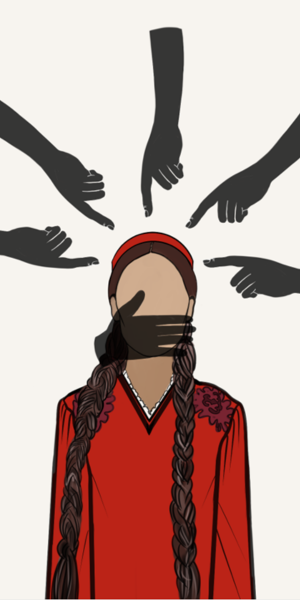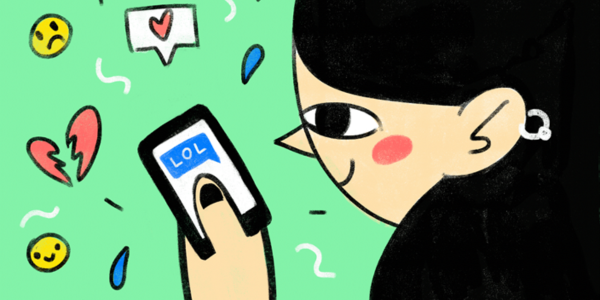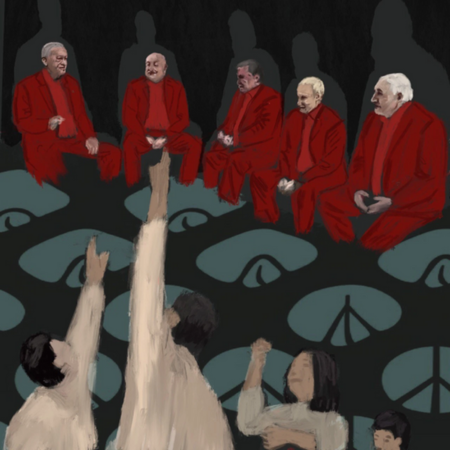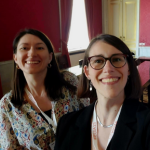by Karolina Kluczewska and Laura Luciani
In many countries around the world, feminist politics are marginalised or face resistance from governments and societies alike – and this is also the case in post-socialist Eurasia. As an additional challenge, gender-related discourses in this region are dominated by international donors, which promote a one-size-fits-all, neoliberal approach based on universal human rights and gender equality as a means for democracy promotion. In recent years, however, a new generation of small-scale, grassroots feminist initiatives has emerged which are oriented towards social justice, but also more sensitive than donors towards local realities. These grassroots feminist groups often face a dilemma: should they strategically soften their approach to avoid backlash and reach a broader audience, or should they purposefully use blunt and provocatory language to disrupt dominant gender norms?
For several years, we have conducted research on political and social developments in the South Caucasus (Laura) and Central Asia (Karolina). We looked into gender politics as a field of normative struggles between governments, international donors and local civil society initiatives. In the course of our research, we met with several activists who try to reimagine gender roles in their societies. We were struck and inspired by the vision of three groups from Tajikistan, Kazakhstan and Azerbaijan – as it is expressed through the vocabulary, tools and visuals they use to advance their ideas. These groups skilfully synthesise intersectional feminist thinking with the particular national contexts in which they operate, each in their unique way.
Breaking taboos in Tajikistan
Tell Me Sister is an Instagram page that talks about various forms of harassment, mostly sexual, women in Tajikistan experience on the streets, in families and in workplaces. Since 2020, it has published first-hand accounts of intimidation, catcalling and physical assaults.
Psychological and physical forms of violence against women are a common phenomenon in the country, and they are largely surrounded by a culture of acceptance and silence. While many international organisations finance projects to tackle domestic violence in Tajikistan, they remain ineffective due to a lack of sufficient attention to socio-economic provisions. These projects also focus on fostering individual rights of women, which ignores the structural inequalities and the collective culture of the country that prioritises the group over the individual. Tell Me Sister contributes to creating a new collective culture based on mutual support and nuances the discourse on gender-based violence in Tajikistan.
A few years ago, the founder of Tell Me Sister Elena Nazhmetdinova watched a video where women in Tajikistan discussed how they experienced harassment. Many users commenting on the video implied that it was probably these women’s fault if they faced harassment, because of how they behaved or dressed. Commenters referred to these women using the common Tajik expression of “sisters”, before giving them advice on how to avoid provoking men through a revealing outfit in the future.
This incident inspired Nazhmetdinova and her friend Farzona Saidzoda to name their page Tell Me Sister. First, this plays with the patronising and manipulative way the word “sister” is often used, both by men and women, to discipline girls. But even more importantly, the page aims to reclaim the idea of sisterhood by creating a collective, safe space for women to share their experiences anonymously, in many cases for the first time. It is not uncommon for women to use the page to discuss incidents that happened years before, but never found the courage to tell anyone.
The posts published on the Instagram page frequently include an explanation of what the women wore when they were harassed, perhaps a way for the victims to pre-emptively rebut accusations that they were themselves responsible for the assault. As Nazhmetdinova told us, the women’s comments “show that the outfit wasn’t the problem. In many stories, the girls first mention that on that day they were wearing humble clothes, jeans and a baggy t-shirt, or the Tajik national dress.”
Still, as a deliberate strategy, Tell Me Sister does not present itself as a feminist initiative. Rather, it is meant as a social media intervention that reveals the scale of harassment in Tajikistan. “Tajik society is not well prepared for feminism. Tajik men, and often women too, see the word feminism as a red flag”, Nazhmetdinova adds. “They get angry when you even pronounce it, no matter the context and the content. You need to find the right approach to make people admit: yes, you’re right.”
Many Tell Me Sister followers are women who can relate to the experiences shared by other women. The page also periodically publishes illustrations that often lack any face features, suggesting that anyone – even someone we know – may become a victim of harassment. Nazhmetdinova realises that the page cannot reach the whole population and stop harassment altogether. Most of the content is published in Russian rather than Tajik, and the initiative mainly speaks to the urban youth, who are active social media users. When Tell Me Sister published some stories in Tajik, many followers actually asked for it to be translated into Russian.
People living in Tajikistan’s capital city frequently share a prejudice that harassment occurs mostly in rural areas, where people are more conservative, and mostly affects less educated people. The stories Tell Me Sister publishes, however, challenge this narrative, as “they show that harassment is also perpetuated by men who have several degrees, studied abroad and speak many languages,” Nazhmetdinova says. These testimonies reveal the endemic nature of harassment in the country, regardless of age, language, or education.
 One of the illustrations used by Tell Me Sister, designed by Nazokat Davlatshoeva. Courtesy of Elena Nazhmetdinova. The picture shows a young woman wearing a traditional Tajik dress, which is locally associated with modesty and purity, as opposed to so-called “Western”, more revealing clothing. This is to say that women can face harassment regardless of what they wear. The woman is faceless, suggesting that this could be anyone we know. Fingers pointing at her from multiple directions hint at common judgemental attitudes towards victims of harassment that may also come from family members, colleagues and friends. This discourages women from speaking out about their experiences.
One of the illustrations used by Tell Me Sister, designed by Nazokat Davlatshoeva. Courtesy of Elena Nazhmetdinova. The picture shows a young woman wearing a traditional Tajik dress, which is locally associated with modesty and purity, as opposed to so-called “Western”, more revealing clothing. This is to say that women can face harassment regardless of what they wear. The woman is faceless, suggesting that this could be anyone we know. Fingers pointing at her from multiple directions hint at common judgemental attitudes towards victims of harassment that may also come from family members, colleagues and friends. This discourages women from speaking out about their experiences.
Normalising sexuality in Kazakhstan
To Tajikistan’s north, feminist groups in Kazakhstan face similar challenges to Tell Me Sister.
Founder Karlygash Katabova came up with the idea of starting UyatEmes.kz in 2017, when, as she conducted research on sex education in Kazakhstan, she realised many teenagers lacked basic knowledge on sex and reproductive health.
Like in Tajikistan, gender-based violence remains a widespread phenomenon in Kazakhstan. Public debate focuses mainly on the legal framework that would sufficiently protect women from abuse, as exemplified by the long ongoing discussions about the draft law on domestic violence. The underlying societal attitudes and practices that legitimise violence receive lesser attention. Normalising discussions about sexuality among the youth is one means to reshape collectively shared gender norms – and this is what UyatEmez.kz aims to do.
Translating as “[it’s] not a shame, Kazakhstan”, UyatEmes.kz is a website, a chatbot, and a Facebook and Instagram account on sex education. But rather than a feminist initiative, UyatEmes.kz defines itself as a “resource about growing up, relationships and safety.” The group primarily targets teenagers, who start to explore their sexuality as their bodies change while growing up. Parents are another important audience, because many would like their children to know more about sex and reproductive health, but are too embarrassed to discuss these issues.
In this context, choosing the right tone to talk about sexuality was a challenge. The team realised that the language needed to be simple and warm, but technically precise. It also had to appeal to the youth, but without coming across as too direct or even provocatory in the cultural context of the country. “I knew that it had to speak to parents, it had to appeal to these values that we all agree on: that we want our children to be safe,” Kabatova explains. “I often tell parents: if you can’t talk to your child, read our website and if you like it, share the link with them.”
The website features articles explaining to teenagers what menstruation is, how to navigate their first relationship, and why consent for sex is needed. It encourages teenagers to be more self-confident, helps to choose sanitary pads, and explains how to use condoms. There is also a column for parents, which gives tips on how to speak to children about body parts and sex.
Because UyatEmes.kz aims to attract a general audience, it does not explicitly address LGBTQ issues, for example, which are contentious in conservative Kazakhstan, although there is content on sexual orientation. According to Kabatova, this is one of the tradeoffs of the group’s approach: “We are sometimes criticised by more progressive activists for not talking enough about LGBTQ rights. Yes, we don’t, because we want to reach more people. If we focus too much on sensitive topics, we risk losing the majority of readers who may not be ready to talk about LGBTQ issues.”
UyatEmes.kz is available in Russian and Kazakh, the two most widely spoken languages in Kazakhstan. Preparing the content in Kazakh proved to be a challenge, however, as much of the vocabulary concerning sexuality either has a pejorative, vulgar meaning or seems too artificial and disconnected from everyday language. “If you don’t talk about sexuality, there are no words for it,” Kabatova comments, “so our solution is to be more descriptive and to explain the context.”
In this regard, visuals are an important component of UyatEmes.kz’s strategy. Drawings need to be appealing for the youth, without being too explicit. Kabatova recalls that initially she wanted pictures to be less straightforward: “Our artist was more progressive, while I was afraid that people would not accept our project and I insisted that we should beat around the bush.” But over time, as the initiative received support from various social groups, Kabatova changed her mind: “Now I think that we should be more direct and name things what they are.”
One of illustrations used by UyatEmes.kz, designed by Daria Sazanovich. Courtesy of Karlygash Kabatova. It features a teenage girl navigating her first romantic relationships through a smartphone. Nowadays, social relations are largely mediated through the screen. This offers an additional shield of anonymity and comfort to teenagers who lack confidence, but also brings about new challenges related to miscommunication and cyberbullying.
Reclaiming feminist peace in Azerbaijan
In Azerbaijan, another group adopted a different strategy from UyatEmes.kz, as appears already in their name: the Feminist Peace Collective. In a society dominated by ethnic nationalism and militaristic rhetoric, this group was formed to convey an explicitly feminist peace discourse.
The thirty-year long unresolved conflict with neighbouring Armenia over the contested region of Nagorno-Karabakh, and the resulting militarisation of society, have reinforced patriarchal and heteronormative structures in Azerbaijan. Vocal women opposed to the authoritarian regime have often been the target of smear campaigns and personalised attacks. Repression has become more virulent since Azerbaijan’s victory in the 2020 Nagorno-Karabakh war, in a context where feminist activism is seen as disturbing the “national unity” that the government promotes.
Still, in the aftermath of the war, three female activists founded the Feminist Peace Collective – a decentralised network and online platform to link efforts across the feminist and peacebuilding communities in the country. Co-founder Lala Darchinova recalls that, for many years, Western donors dictated the agenda in the peacebuilding and gender arena in Azerbaijan, sidelining local voices. The usual focus was on gender-based violence or on women’s inclusion in conflict resolution. Instead, the Feminist Peace Collective comes from “a more radical worldview,” says Darchinova, and it does not shy away from making this explicit.
“We position ourselves as a left-wing and a political group,” Darchinova explains. “So far, groups addressing gender or peace issues have not necessarily named themselves as political. We think this is not right, because if we are in feminism or in peacebuilding, it’s already political.”
The research articles, statements and artwork that appear on the Collective’s website explore how President Aliyev’s authoritarian regime feeds, and feeds on the state of permanent war in Azerbaijan. According to the collective, Russia’s aim to maintain its dominance in the region and Western economic interests, which prioritise resource extraction over human rights, are complicit in the status quo. They denounce the social and political consequences of militarisation, including in their effects on women, and call for resistance and grassroots-led peacebuilding. For example, the documentary “Behind 44 days” foregrounds a social worker’s painful account of the humanitarian catastrophe caused by the recent war. While ordinary people suffer all around her, the president and cheering crowds celebrate the heroes of the “patriotic war”.
The illustrations of queer artivist Lili Nazarov embody these messages, evoking both the collective suffering of women and their resistance with fists raised against the country’s leader and regional autocrats, needless to say all men. The Collective primarily addresses local audiences through collaborations with Azerbaijani researchers and artists, and by producing and translating feminist peace resources in the Azerbaijani language.
While some texts are academic in style, multimedia content gives voice to ordinary people’s experiences of war and violence in an accessible language. For example, in a recent cooperation with the platform CaucasusTalks, the Collective anonymously published first-person stories of Caucasian women who endured sexual harassment and abuse. The texts are available in the Azerbaijani, Armenian and Georgian languages, because “patriarchy and violence recognize no nationality, race or state borders,” the Collective explains on their website. The goal is to foster transnational feminist solidarity by talking about shared problems in a region where these are usually confined within nation-state borders.
Feminist ideas are shunned by Azerbaijani society, which is why for a long time people avoided this term, preferring the more neutral labels of “gender experts” or “gender activists”. But a new generation of activists has appeared over the last four years, as government-imposed restrictions on donor funding to NGOs have spurred less institutionalised forms of civic engagement and more political claims. Darchinova considers it important to reclaim and popularise feminism, despite social resistance: “Feminism is not welcomed by the majority, but it is also an umbrella of protection, a safe space for everyone who wants to go beyond the hegemonic, masculine lifestyle.”
She is aware that the Collective remains a marginal voice in Azerbaijan, where leftist ideas do not have any political influence: “Freedom of speech is not a thing here,” Darchinova says. Still, their work aims to disrupt dominant narratives by bringing in alternative voices around conflict resolution and political developments. “We reject the notion that from authoritarianism we should go to liberalism. There should be a third way and there should be political groups who are able to share this imagination.”
One of Lili Nazarov’s illustrations for the Feminist Peace Collective. Courtesy of Feminist Peace Collective. Fingers are pointed at Azerbaijani president Ilham Aliyev, who is surrounded by fellow authoritarian, warmongering, male leaders from Turkey, Russia and beyond. While the autocrats are recognisable, the people looking at them are almost faceless – as if they were seeking agency, but remain powerless within bigger geopolitical games. The more it approaches the level of political leaders, the more the peace symbol in the background gets distorted – suggesting that peace discourse is manipulated to ensure authoritarian stability.
***
As elsewhere in Eurasia and beyond, activists in Azerbaijan, Tajikistan, and Kazakhstan continue facing the crucial dilemma of whether to present their work as feminist and, if so, how exactly. No choice is free of drawbacks. On the one hand, an explicitly feminist vocabulary allows these groups to remain loyal to their ideas, but makes them unpopular among the society. On the other, using a more neutral language helps them gain social support, but softens the political claims of their struggles.
By presenting these three stories together we aim to highlight similarities between their struggles and foster solidarities between feminist initiatives in Eurasia and beyond.
Karolina Kluczewska (left) is a postdoctoral researcher at Ghent University in Belgium. Her current research explores social policy in Eastern Europe and Central Asia.
Laura Luciani (right) is a postdoctoral researcher at Ghent University in Belgium. Her research focuses on human rights, democratisation, civil society and gender in the South Caucasus.




